(完整word版)一般疑问句、特殊疑问句
(完整word版)外研版小学英语语法总复习知识点归纳

(完整word版)外研版小学英语语法总复习知识点归纳外研版小学英语语法总复知识点归纳一、时态1.一般现在时(1)表示经常发生的动作或事情,通常用“usually通常,often常常,every…每…。
sometimes有时,always总是,”等词。
(2)基本结构:主语I / You / We / They /He / She / It肯定句:主语+动词原形或动词第三人称单数形式否定句:主语+don’t + 动词原形或者doesn’t + 动原一般疑问句(Yes/No) Do…。
Yes。
I do.No,I don’t.Does…(动词原形)…?Yes,he/she does。
No,he/she doesn’t.特殊疑问句What do …。
How does she…(动词原形)…?(3)动词第三人称单数方式(同名词单数酿成复数办法不异)1.普通情形+s如:walk-walks2.辅音字母+y结尾去y +ies fly-flies3.结尾是s。
x,sh。
ch +es watch-watches4.结尾是0 +es do-does。
go-goes5.特殊have-has2.现在进行时(1)表示正在发生的动作,通常用“now现在。
look看,XXX听”.(2)根本方式: be +动词-ingeg: I am(not) XXX.You/We/They are(not) reading。
He/She/It is(not) eating.What are you doing。
Is he reading?(3)动词的目前分词方式(动词+ing)普通情形+ing walk—walking末端是不发音的e-e+ingcome—coming重读闭音节双写末了一个字母+ingswim-swimming。
run-running3.一般过去时(1)表示过去已经发生的事情,通常用“last …上一个…。
just now刚才,many years ago许多年前,XXX昨天”等词。
一般疑问句和特殊疑问句完整版
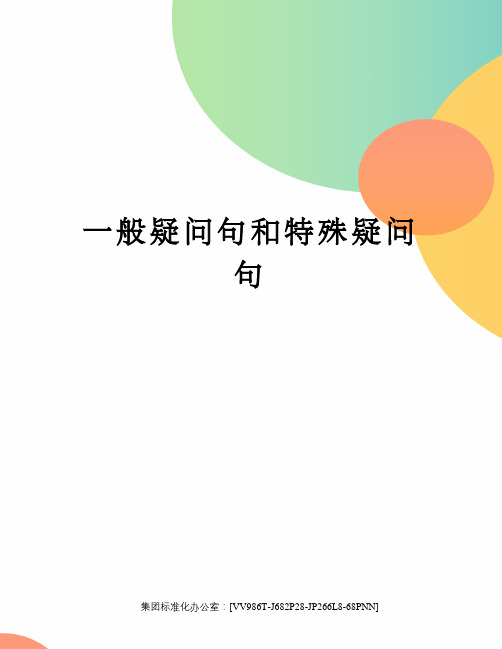
一般疑问句和特殊疑问句集团标准化办公室:[VV986T-J682P28-JP266L8-68PNN]一般疑问句与特殊疑问句Date:_______ name:_______一、【一般疑问句】1. 定义:用be、助动词或情态动词置于句首,并以“Yes,…”,或“No,…”或相当于yes / no回答的问句称为一般疑问句.2. 含系动词be的一般疑问句的构成:Be +主语+其它注意:am 只能跟在第一人称的单数 I 后面;are 搭配 you,不管you是单数还是复数;is 跟在第三人称单数 he, she, it后面Eg: I'm in Class 2, Grade 7.→ Are you in Class 2, Grade 7 (如遇第一人称,最好将其置换成第二人称)It's a map of China.→Is it a map of China这是一幅中国地图吗3. 含实义动词的一般疑问句的构成:Do/Does +主语 + 动词原形 + 其它注意:主语为第三人称单数,谓语动词为一般现在时单数第三人称形式"v-(e)s"时,用does,并要将谓语动词变回原形(如has→have,likes→like等);有时陈述句中的some还要变作any等。
如:Eg: She lives in Beijing. →Does she live in BeijingI like English. →Do you like EnglishThere are some books on my desk.→Are there any books on your desk4. 含情态动词的一般疑问句的构成:情态动词+主语+动词原形+其它Eg: I can spell it. →Can you spell it?I will do that for her. →Will you do that for her?She can drive. →Can she drive5. 一般疑问句的应答动词保持一致。
(完整版)情态动词,特殊疑问句,一般疑问句.doc
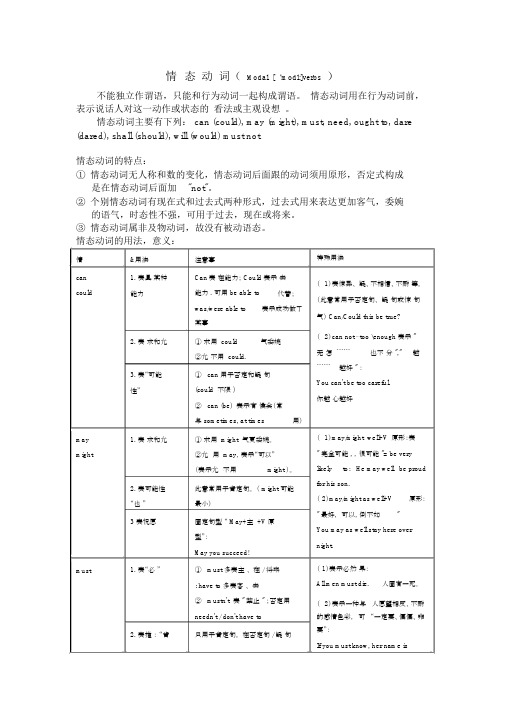
情态动词(Modal [‘modl:]verbs)不能独立作谓语,只能和行为动词一起构成谓语。
情态动词用在行为动词前,表示说话人对这一动作或状态的看法或主观设想。
情态动词主要有下列: can (could), may (might), must, need, ought to, dare (dared), shall (should), will (would) must not.情态动词的特点:① 情态动词无人称和数的变化,情态动词后面跟的动词须用原形,否定式构成是在情态动词后面加"not"。
② 个别情态动词有现在式和过去式两种形式,过去式用来表达更加客气,委婉的语气,时态性不强,可用于过去,现在或将来。
③ 情态动词属非及物动词,故没有被动语态。
情态动词的用法,意义:情&用法注意事can 1. 表具某种Can表在能力; Could 表示去could 能力能力 . 可用 be able to 代替;was/were able to 表示成功做了某事2. 表求和允① 求用 could 气委婉②允不用 could.3. 表“可能① can 用于否定和疑句性”(could 不限 )② can (be) 表示有候会(常与 sometimes, at times 用)may 1. 表求和允① 求用 might 气更委婉。
might ②允用 may,表示“可以”(表示允不用might )。
2. 表可能性此意常用于肯定句。
( might 可能“也”最小)3 表祝愿固定句型“ May+主 +V 原型”:May you succeed!must 1. 表“必”① must 多表主、在 / 将来; have to 多表客、去② mustn't 表 " 禁止 " ;否定用needn't / don't have to2. 表推:“肯只用于肯定句。
(完整word版)初中英语一般疑问句与特殊疑问句小结
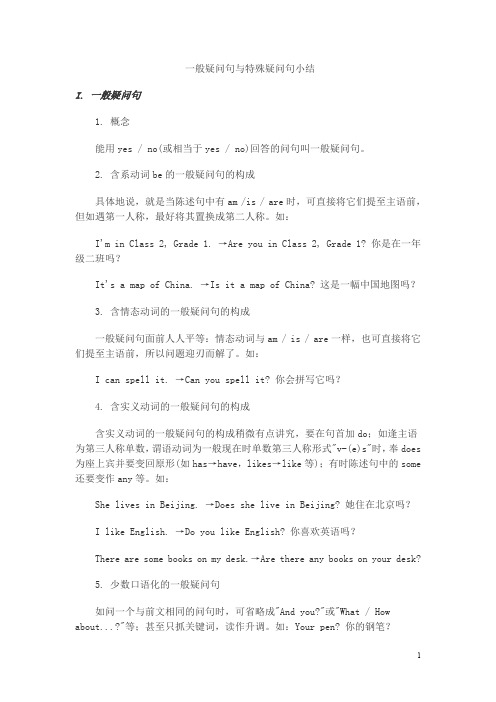
一般疑问句与特殊疑问句小结I. 一般疑问句1. 概念能用yes / no(或相当于yes / no)回答的问句叫一般疑问句。
2. 含系动词be的一般疑问句的构成具体地说,就是当陈述句中有am /is / are时,可直接将它们提至主语前,但如遇第一人称,最好将其置换成第二人称。
如:I'm in Class 2, Grade 1. →Are you in Class 2, Grade 1? 你是在一年级二班吗?It's a map of China. →Is it a m ap of China? 这是一幅中国地图吗?3. 含情态动词的一般疑问句的构成一般疑问句面前人人平等:情态动词与am / is / are一样,也可直接将它们提至主语前,所以问题迎刃而解了。
如:I can spell it. →Can you spell it? 你会拼写它吗?4. 含实义动词的一般疑问句的构成含实义动词的一般疑问句的构成稍微有点讲究,要在句首加do;如逢主语为第三人称单数,谓语动词为一般现在时单数第三人称形式"v-(e)s"时,奉does 为座上宾并要变回原形(如has→have,likes→like等);有时陈述句中的some 还要变作any等。
如:She lives in Beijing. →Does she live in Beijing? 她住在北京吗?I like English. →Do you like English? 你喜欢英语吗?There are some books on my desk.→Are there any books on your desk?5. 少数口语化的一般疑问句如问一个与前文相同的问句时,可省略成"And you?"或"What / How about...?"等;甚至只抓关键词,读作升调。
特殊疑问句及一般疑问句的用法
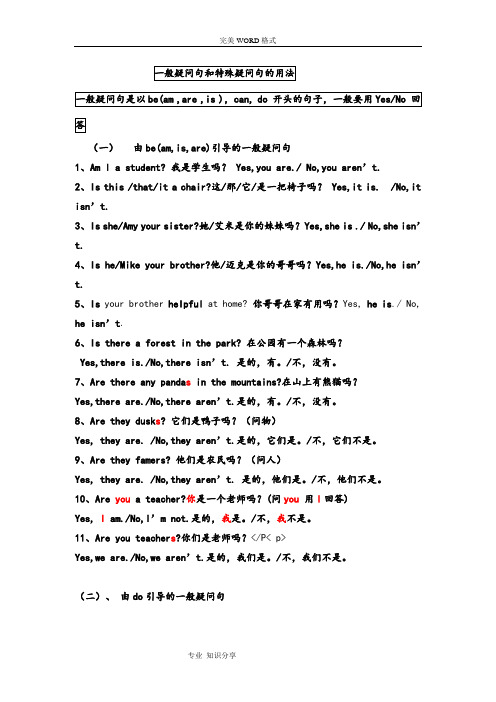
(一)由be(am,is,are)引导的一般疑问句1、Am I a student? 我是学生吗? Yes,you are./ No,you aren’t.2、Is this /that/it a chair?这/那/它/是一把椅子吗? Yes,it is. /No,it isn’t.3、Is she/Amy your sister?她/艾米是你的妹妹吗?Yes,she is ./ No,she isn’t.4、Is he/Mike your brother?他/迈克是你的哥哥吗?Yes,he is./No,he isn’t.5、Is your brother helpful at home? 你哥哥在家有用吗?Yes, he is./ No, he isn’t.6、Is there a forest in the park? 在公园有一个森林吗?Yes,there is./No,there isn’t. 是的,有。
/不,没有。
7、Are there any panda s in the mountains?在山上有熊猫吗?Yes,there are./No,there aren’t.是的,有。
/不,没有。
8、Are they dusk s? 它们是鸭子吗?(问物)Yes, they are. /No,they aren’t.是的,它们是。
/不,它们不是。
9、Are they famers? 他们是农民吗?(问人)Yes, they are. /No,they aren’t. 是的,他们是。
/不,他们不是。
10、Are you a teacher?你是一个老师吗?(问you 用I回答)Yes, I am./No,I’m not.是的,我是。
/不,我不是。
11、Are you teacher s?你们是老师吗?</P< p>Yes,we are./No,we aren’t.是的,我们是。
(完整word版)疑问句大全——一般疑问句、特殊疑问句、选择疑问句、反意疑问句,推荐文档

疑问句(questions)指提出问题,请对方回答的句子。
疑问句句末要用问号。
按结构可分为四种:一般疑问句、特殊疑问句、选择疑问句、反意疑问句。
(一)一般疑问句1、一般疑问句概述一般疑问句(general questions),也可称为“yes/no” questions(是否型问句),因为它一般是由yes或no回答的,如:—Can you swim to the other side?你能游到对岸吗?—Yes, I can.是的,我能。
—No,I can’t.不,我不能。
—Have you locked the door?你锁门了吗?—Yes,I have.是的,锁了。
—No,I haven’t. 不,没有锁。
2一般疑问句的结构(1)基本的结构为:be/助动词/情态动词+主语+谓语/表语+(其他),句子要读升调,如:Are they your friends?他们是你的朋友吗?Does he go to school on foot?他是步行去上学吗?Will you be free tonight?你今晚有空吗?Can you play basketball?你会打篮球吗?(2)陈述句亦可用作一般疑问句,多用在非正式文体中,句末有问号,用升调,如:Somebody is with you?有人和你一起吗?He didn’t finish the work?他没有做完活吗?You are fresh from America,I suppose?我猜,你刚从美国回来吧?3、一般疑问句的答语(1)一般疑问句一般由yes或no来回答,如:—Are you tired?你累了吗?—Yes,I am.是的,累了。
—No, I’m not.不,不累。
—Does she do the cleaning?她扫除了吗?—Yes ,she does.是的,她打扫了。
—No,she doesn’t.不,她没打扫。
一般疑问句和特殊疑问句知识点总结

一般疑问句和特殊疑问句知识点总结一、一般疑问句。
1. 定义。
- 一般疑问句是用来询问某事是否属实,需要用“是(yes)”或“否(no)”来回答的疑问句。
例如:“Are you a student?”(你是一名学生吗?)2. 结构。
- be动词(am/is/are/was/were)开头的一般疑问句。
- 当句子中有be动词时,将be动词提到句首,句末加问号,句子中的主语如果是第一人称要变为第二人称。
- 肯定句:I am a teacher.(我是一名教师。
)- 一般疑问句:Are you a teacher?(你是一名教师吗?)- 其回答形式为:Yes, 主语+be动词. / No, 主语+be动词+not.- 例如:Are you from China? Yes, I am. / No, I'm not.- 助动词(do/does/did)开头的一般疑问句。
- 当句子中的谓语动词是实义动词,且句子时态为一般现在时(主语不是第三人称单数用do,主语是第三人称单数用does)或一般过去时(用did)时,将助动词提到句首,动词恢复原形,句末加问号。
- 肯定句:He likes apples.(他喜欢苹果。
)- 一般疑问句:Does he like apples?(他喜欢苹果吗?)- 肯定句:I played football yesterday.(我昨天踢足球了。
)- 一般疑问句:Did you play football yesterday?(你昨天踢足球了吗?)- 回答形式为:Yes, 主语+do/does/did. / No, 主语+don't/doesn't/didn't.- 例如:Do they go to school by bike? Yes, they do. / No, they don't.- 情态动词(can/could/may/must等)开头的一般疑问句。
(完整版)小学英语一般疑问句、否定句和特殊疑问(附习题)(可编辑修改word版)
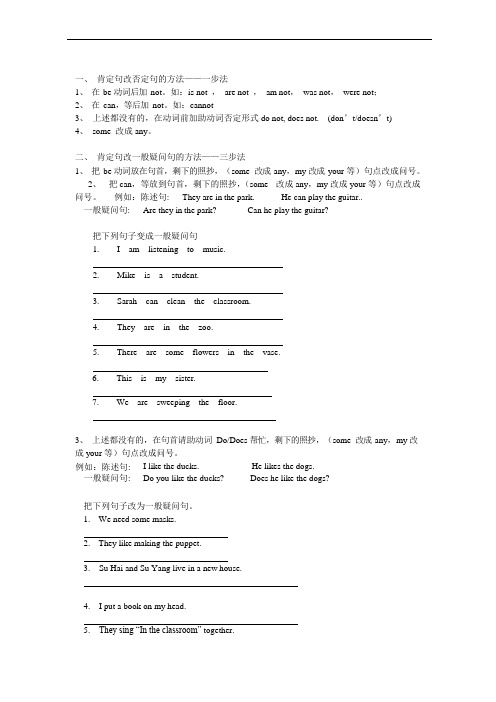
一、肯定句改否定句的方法——一步法1、在be 动词后加not。
如:is not ,are not ,am not,was not,were not;2、在can,等后加not。
如:cannot3、上述都没有的,在动词前加助动词否定形式do not, does not. (don’t/doesn’t)4、some 改成any。
二、肯定句改一般疑问句的方法——三步法1、把be 动词放在句首,剩下的照抄,(some 改成any,my 改成your 等)句点改成问号。
2、把can,等放到句首,剩下的照抄,(some 改成any,my 改成your 等)句点改成问号。
例如:陈述句: They are in the park. He can play the guitar..一般疑问句: Are they in the park? Can he play the guitar?把下列句子变成一般疑问句1. I am listening to music.2. Mike is a student.3. Sarah can clean the classroom.4. They are in the zoo.5. There are some flowers in the vase.6.This is my sister.7.We are sweeping the floor.3、上述都没有的,在句首请助动词Do/Does 帮忙,剩下的照抄,(some 改成any,my 改成your 等)句点改成问号。
例如:陈述句: I like the ducks. He likes the dogs.一般疑问句: Do you like the ducks? Does he like the dogs?把下列句子改为一般疑问句。
1.We need some masks.2.They like making the puppet.3.Su Hai and Su Yang live in a new house.4.I put a book on my head.5.They sing “In the classroom” together.6.We play basketball on Sundays.7.Tom likes listening to music三、肯定句改特殊疑问句的方法——四步法1、在一般疑问句的基础上,句首添加一个疑问词即可,可根据划线部分确定是什么疑问词。
- 1、下载文档前请自行甄别文档内容的完整性,平台不提供额外的编辑、内容补充、找答案等附加服务。
- 2、"仅部分预览"的文档,不可在线预览部分如存在完整性等问题,可反馈申请退款(可完整预览的文档不适用该条件!)。
- 3、如文档侵犯您的权益,请联系客服反馈,我们会尽快为您处理(人工客服工作时间:9:00-18:30)。
陈述句含义:用于陈述事实和观点的句子。
陈述句包括肯定结构和否定结构。
This is a desk.(肯定结构)He can sing and dance.(肯定结构)He doesn’t have a computer.(否定结构)There aren’t any pictures.(否定结构)肯定句变否定句:1.be动词的否定式be:am ,is ,are,was were构成否定式时,一律在后面加否定词notHe is reading. →He is not reading.They are from China. →They are not from China.2. 情态动词的否定式情态动词:can, could, must , may, might, will, would,shall,should , need,……构成否定式时,一律在情态动词后面加否定词notI can swim. →I can not swim.You should arrive here on time.→You should not arrive here on time.构成否定式时,要借助助动词do, does, did,在一般现在时中用do或者does,在一般过去时中用did。
结构为:主语+don’t\doesn’t\didn’t+动词原形+其它I like pop music. →I don’t like pop music.She often swims. →She doesn’t often swim.He handed in his homework.→He didn’t hand in his homework.一般疑问句含义:一般疑问句是疑问句的一种。
它是只用yes(是)或no(否)来回答的句子。
其结构是:系动词be/助动词/情态动词+主语+其他成分1)谓语动词是be动词规律:He is a student. Is he a student?1She is swimming. Is she swimming?2)谓语中含有助动词have/has/had (通常是在现在完成时和过去完成时中:have / has / had + 过去分词)规律:Tom has finished his homework. →Has Tom finished his homework?I have eaten breakfast. →Have you eaten breakfast?3)谓语动词中含有情态动词时。
规律:He can swim. →Can he swim?I should go to school. →Should I go to school?4)谓语动词是行为动词,必须在句首加上助动词。
加上这些助动词后,句子中谓语动词必须用原形。
规律:Tom built a science lab himself lab when he is 20 years old.→Did Tom build a science lab h imself lab when he is 20 years old?She likes drinking milk. →Does she drink milk?They often swim. →Do they ofen swim.注意:1.把肯定句改成一般疑问句时,要注意句中是否有already,some,something,somebody等词,如果有,就要进行改变。
already,some,something,somebody等分别改成yet,any,anything,anyone She has already finished her work. →Has she finished her work yet?2.注意人称的变化。
My mother is a teacher.Is your mother a teacher?3.以下问句固定的回答:Is this/that/a/an+物--------yes,it is./No,it isn’t.Are they /those/these…?---------Yes,they are./No,they aren’t.特殊疑问句含义:以疑问代词或疑问副词开头,提出疑问的句子。
基本结构:特殊疑问词+一般疑问句注意:A疑问词的选择:1.疑问代词who谁,whom谁,whose谁的,which哪些(个),what什么2. 疑问副词(作状语)2when何时,where何地,why为什么,how如何,how much多少(不可数) ,how many多少(可数),how long多久,how old多大年纪,how far多远。
1)问“谁”用who或whomLeilei is a doctor. Who is a doctor?(对主语提示用who,对宾语提问用who,whom均可)2)问“谁的”用whoseThis is his book. Whose book is this?3)问“哪个”用which,whatI like this one among thesree three.Which do you like among these three?I like English best. What do you like best?4)问“时间”用when或what timeI go there in the morning ? When do you go thereIt is 4 o’clock. What time is it?(when既可以对时间点提问,也可对年、月、日等时间提问;what time通常只对时间点提问)5)问“地点”用whereThe ball is under the bed. Where is the ball?6)问“原因”用WhyHe did not come because he was ill.Why did not he come?7)问“方式”或“身体状况”用howHe did it in that way. How did he do it.I am fine. How are you?B疑问句的语序:1.对句子的主语提问,其语序是疑问词+谓语+其他成分She is their teacher. Who is their teacher?2.对句子主语的定语提问,其语序是疑问词+主语+谓语+其他成分My book is over there. Whose book is over there?3.对表语、宾语或状语提问,其语序是疑问词+一般疑问句He lives in Beijing. Where does he live?4.对表语或宾语的定语提问,其语序是疑问词+表语或宾语+一般疑问句I am looking for my watch. Whose watch are you looking for?C 如何完成对划线部分提问?1.针对划线部分找准要使用的特殊疑问词2.把原句变成一般疑问句3.用第一步中的特殊疑问句加第二步的一般疑问句(去掉划线部分)3My name is Mary.What为疑问词 Is your name Mary? What is your name?They are from Japan.Mary made a cake for her mother.He had learned English before he went to middle school.The sun rises in the east.They can go there by bus.练习选择正确的单词填空1._____ is that pretty girl? She is my sister.2._____ are Jack and Tom? They are behind you.3._____ do you go to school? I go to school from Monday to Friday.4.______ are the apples? They are 10 yuan.6._____ is your mother? She is a teacher.7._____ are you going? We are going to the bakery(面包坊).8.______ did Jim and Wendy travel to Beijing ? They traveled there by plane9. ____________is the skirt? It’s red.10. _________ do you go to the cinema? Twice every week.11. did you be late for school? Because I got up late.一.将下列句子改成一般疑问句:1. It is a lovely dog.________________________________________2. I am a doctor. _____________________________________3. We are classmates. _____________________________________4. I play computer games every night._____________________________________5. He likes English. _____________________________________6. His father goes to work by bus. _____________________________________7. I want a new toy. _____________________________________8. She finished reading the books two days ago.____________________________9. She has some story book. _____________________________________10. I can dance and sing. _____________________________________11 He has some brothers. _____________________________________12. They have gone to Beijing. _____________________________________413. She has finished her homework. _____________________________________把肯定句变为否定句1. His father is an English teacher._____________________________________.2. These cats are crying.(喊叫) _____________________________________.3. They can swim. _____________________________________.4. They went to work on foot last year.___________________________________ .5. He likes English. _________________________________________6.They werestudents. .7.She was shy.I.对画线部分提问、1. They bought a new bike yesterday.____________________________________________________2. She is a nurse .____________________________________________________3. She is my teacher.____________________________________________________4. He bought the red one .____________________________________________________5. It is my coat .____________________________________________________6. I am looking for my sister .____________________________________________________7. I get up at six .____________________________________________________8. I am from Hubei .____________________________________________________9. I went to school late because I got up late.____________________________________________________10.They are five yuan .______________________________________________________5一、将下列句子变成一般疑问句1.Mr .Wang is 30 years old.2.The elephant’s ears are long.3.We like birds.4.I can sing and dance.5.Tom has finished his homework.二、对划线部分提问1.1)They are cleaning their classroom now.They cleaning now.2)he often has supper at home.He often supper?3)I got up at 6 o’clock this morning.you get up this morning .4)he finished the book last Sunday.He the book?5)I didn’t go to school because I had a bad cold.you go to school?6)You had better take the No.3 bus.Bus had I better take?7)He is feeling well.He feeling?8)He comes to China once a year.he come to China?9)They were drawing a horse when I came in.6they when I came in?(10)Hundreds of people died in the war.people in the war.(11)She watches TV every night.she watch TV. (12)It is about 10 km away from here.It from here? (13)the shirt cost 200 yuan.the shirt cost?2.1)He is my father.2)They are under the tree.3)I often watch TV after dinner.4)Superman flies in the sky.5)Alan likes to play with Bill.6)Joe’s father plays badminton every week.7)The supermarket is near the school.8)Jennifer has a pair of earrings.9)I put the gold fish into the fish tank.10)The monkey sleeps at night.7。
